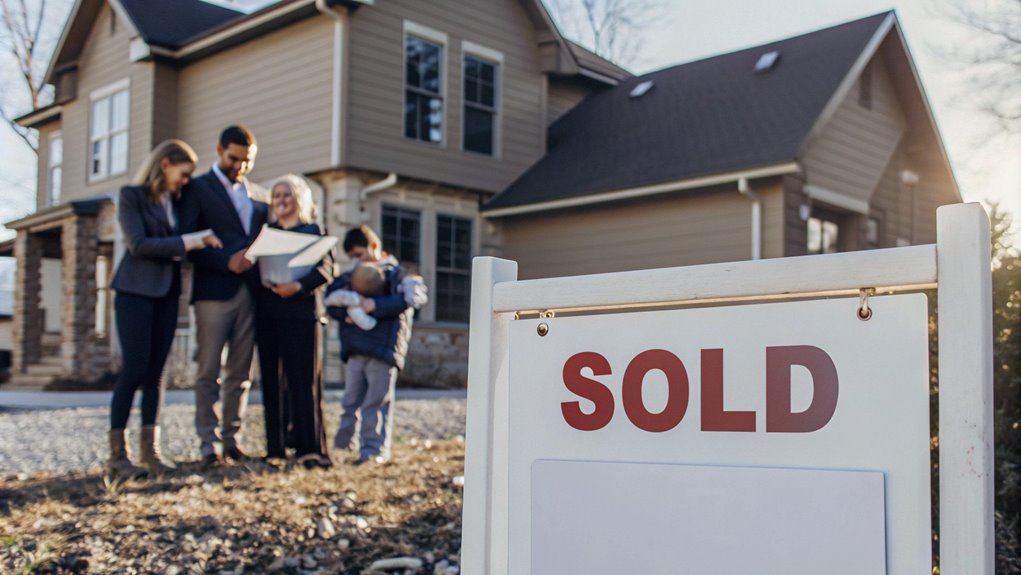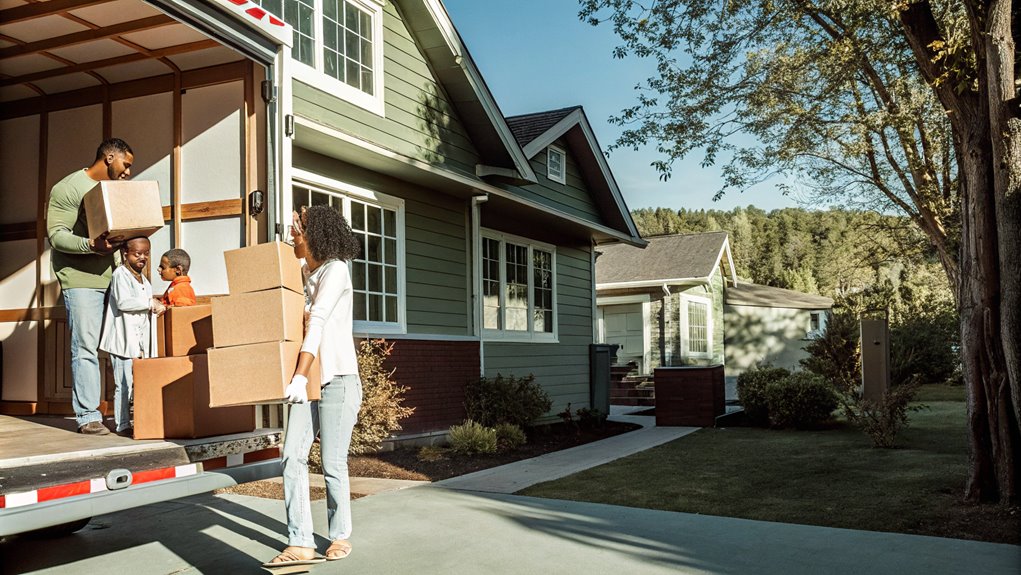Buying a house at the right time can save you money. Prices go up and down with the seasons. You can find better deals in winter when fewer people are looking to buy. Your monthly payments depend on interest rates – even small changes can cost you a lot more money over time. If you buy at the end of the year, you might get tax breaks. Moving in summer costs more than moving in winter. Waiting for school to start might matter if you have kids. Your local job market can change house prices too. When you know these facts, you can make smarter choices about when to buy your new home.
Ready to start building equity in your own Michigan home? Get your personalized home loan quote today.
Seasonal Market Price Fluctuations

When you want to buy a home, prices go up and down during the year. This can help you save money if you know when to buy.
Spring brings lots of people who want to buy houses. More buyers mean higher prices. Houses cost the most in June. You might pay much more than normal then.
Winter is the best time to find a good deal. In January and February, not many people look for houses. People who need to sell their homes may take less money. You can save a lot during these cold months.
Fall is also nice for house hunting. You can find fair prices and still have many homes to pick from.
If you want to save the most money, look for a home between October and February. The sellers want to make a deal, and fewer people are shopping then.
Michigan residents, unlock the door to your new home. Request your home loan quote from Treeside Financial today.
Interest Rate Impact
A small change in your mortgage rate can make a big difference. If rates go up or down by just 1%, you might pay a lot more or less each month.
Think of it like this – over many years, even a tiny rate change could mean paying thousands more dollars for your home.
You can pick a rate that stays the same forever, or one that can change. The changeable rates often start lower, but they might go up later.
Before you choose, look at what rates are doing now and what experts think will happen next. This helps you make a smart choice about your home loan.
Monthly Payment Differences
Buying a home? The interest rate on your loan makes a big impact on what you pay each month.
Let's look at a real example.
Think about buying a $300,000 home. With a 30-year loan at 4%, you'd pay $1,432 each month. But if the rate is 5%, you pay $1,610 each month. That's $178 more every month, or $64,080 more over time.
Many people like you watch these rates closely. A small 1% change in rates means you can buy about 10% more or less house. So at 4%, you could buy a $330,000 home for the same monthly cost as a $300,000 home at 5%.
You might be closer to buying your home than you think
Take our 2-minute home buyer readiness quiz to see how prepared you really are – no credit check required.

When you shop for a home, remember that even tiny rate changes can mean big changes in what you can buy and what you'll pay over time.
Long-Term Cost Analysis
Think of a home loan like a cookie jar. At 4% interest, you'll need to put $143,739 extra cookies in the jar over 30 years for a $300,000 loan.
But if rates go up to 6%, you'll have to add $347,515 cookies. That's $203,776 more cookies!
When you buy a house, you're saving for your future. Lower rates help you save more money faster.
The less you pay in interest, the more money you keep. This saved money could help pay for your kids to go to school or help you take care of yourself when you get older.
The choice you make today about when to buy will matter for many years.
Fixed vs. Variable Rates
Getting a mortgage means choosing how you'll pay interest. Think of it like picking between two paths.
The first path locks in your rate. It stays the same for 15 or 30 years. This means you pay the same amount each month. It's like wearing a warm coat that keeps you safe from cold weather.
The second path changes over time. It starts lower but goes up or down as the market shifts. Your monthly payment might go up or down too. It's like wearing layers you can add or take off.
When rates are very low, many people pick the locked-in rate. It helps them save money over time.
But when rates are high and might go down soon, the changing rate could help you pay less later.
Most people pick locked-in rates when money matters feel shaky. The changing rates work better when things are steady and rates might drop soon.
School Year Considerations

When you have kids in school, picking the right time to buy a home is key. Schools need to know where you live before they can let your kids start class. Most schools want to see that you live in their area one or two months before school starts.
Many parents try to buy homes near good schools in spring and summer. They want to move in before school starts. This means you might need to act fast to get the home you want.
Make sure to check if the school zones might change. Schools sometimes move their lines for which kids go to which school. This can change which school your kids will go to.
It can also change how much homes are worth.
Enrollment Calendar Impact
When you buy a new home, make sure you can sign up your kids for school in time. Schools want to know where you live before they let your kids join.
Most schools start taking new students in spring, about two months before school starts. If you miss these dates, your kids might've to go to a different school than you wanted.
The best schools fill up fast – many save spots for families who sign up early. To get your kids in the school you want, move into your new home at least two months before the school needs your papers.
Competition Among Parents
Parents want good schools for their kids. This makes many families try to buy homes at the same time, right before school starts.
Most parents look for homes from January to March. During this time, home prices go up by 5-7%. From April to June, prices are still high but a bit lower. The rest of the year sees smaller price increases.
Almost half of all parents with kids plan their move around school dates. They want to make sure their children get into the right school.
Smart parents buy homes when fewer families are looking. This happens from July to December. During these months, you'll find less competition and better prices.
| When | How Much Competition | Price Rise |
|---|---|---|
| Jan-March | Most | +5-7% |
| April-June | High | +3-5% |
| July-Dec | Less | +1-3% |
District Zone Changes
School zones can change over summer. This means your kids might go to a different school next year. You want to know about these changes before you buy a home.
To stay in the know:
- Look at school websites often from March to August
- Call the school office to check when changes start
- Look at past changes to see if your area might change soon
- Watch for new houses being built near you – they can lead to school changes
- Talk to other parents about school news
Remember: Small changes in where you live can mean big changes in which school your kids will go to.
Local Economic Cycles
When you want to buy a home, look at what's happening in your town. Big companies near you can affect home prices. When more people get jobs, more people want homes.
Look at your area for signs of growth. Are new stores and offices being built? That means more people might move there.
Watch if new homes are going up too. More buildings mean the area is growing.
When a place is doing well, home costs often go up. This can tell you when it's a good time to buy.
Keep an eye on local news about jobs and building plans. These things help you make smart choices about buying a home.
Tax Benefits and Deadlines

When you buy a home, check when property taxes are due in your area. Each city has different due dates.
These dates can change how much money you need at closing. If you know when taxes are checked, you can pick the best time to buy your home. This can save you a lot of money.
If you buy your home before December 31, you can get tax breaks for that year on things like your loan costs and property taxes.
Property Tax Filing Dates
When you buy a home, you need to know when to pay your property taxes. This helps you save money and plan better.
Most towns check how much homes are worth on January 1. The day you get your house sets up when you start paying taxes.
You usually get your tax bill between July and November. The exact time depends on where you live.
You can save money if you pay early. Many places give you a discount of 1-4% off your bill.
Most towns let you split your tax payments into two parts. You often pay one part in March and one in September.
If your bank handles your taxes through your mortgage, you need to work with them on the dates.
Every town has its own tax dates. Ask your local tax office to find out your exact dates.
Year-End Deduction Deadlines
Buying a home at the right time helps you save money on taxes. If you want tax breaks this year, you need to buy your home by December 31. You can save up to $10,000 on your taxes from things like property tax.
When you buy a home, you pay many costs like loan fees and interest. You need to record these costs by the end of the year to get money back on your taxes.
If this is your first home and you buy it in December, you can get tax breaks right away. But if you wait until January, you'll have to wait a whole year for those tax breaks.
Keep all your papers from buying your home safe. You'll need them when it's time to do your taxes.
Weather and Home Inspections
Getting your house checked works best when the weather helps us see problems clearly.
Let's see how different weather helps find different issues.
When it rains, we can:
- See where water leaks in
- Find puddles that shouldn't be there
- Spot basement problems
In winter, snow makes it hard to:
- Look at the roof well
- Check outside parts of the house
Hot days are good to:
- Test if your AC works right
- See if your house stays cool
Spring helps us find:
- Where water goes when snow melts
- Wet spots in the yard
Fall is perfect to:
- Look at the whole house clearly
- Check if gutters work well
Pick a time when the weather is like what bothers you most about where you live.
This helps find the big problems your house might face.
Moving Industry Peak Times

Moving costs more in spring and summer. Most people move between April and September. During these busy months, moving trucks are hard to get. Moving companies charge more money too.
You can save money by moving in fall or winter. From October to March, prices drop by 20-30%. Moving companies want your business during these quiet months. They often give good deals.
Another tip is to move in the middle of the month. Many people move at the end of the month when their rent is due. This makes end-of-month moves cost more.
If you plan your move wisely, you can spend less and have a better time moving.
Property Competition Levels
The best times to buy a house change as other buyers come and go. Many people look for homes in spring and summer. In fact, almost half of all homes sell during these warm months.
If you shop in winter, you'll see fewer buyers. This means you have a better chance to get the house you want. In January and February, there aren't as many people looking to buy.
During busy times like May to July, you might've to fight harder to get a house. Many homes get lots of offers then. Houses also sell faster in these busy months.
When fewer people are buying, prices often go down. Sellers drop their prices more in quiet times. If you wait for these slow times, you could save money on your new home.
Knowing when to buy can help you get a better deal. Watch the seasons and pick the right time that works for you.
Personal Financial Readiness

Buying a house takes lots of money. First, you need to check if you can afford it. Look at how much you earn and how much you owe. Your debts should be less than half of what you make.
You also need to save a big chunk of money – about 20% of the house price – to put down first. This helps you avoid extra fees.
Your credit score is like a grade that shows how well you pay bills. You want at least a 620, but a 740 or higher gets you better deals.
You also need extra money saved up. Keep enough to pay your bills for three to six months in case something goes wrong.
You'll pay more fees when you buy the house – about 2% to 5% of what it costs.
Don't forget that houses need fixing! Put aside money each year for repairs. You also have to pay taxes and insurance.
If you live in a community with rules, you might pay fees for that too. All these costs add up each month, so plan ahead.
Neighborhood Development Plans
Your home's worth and daily life can change based on what gets built nearby. Look into what your area has planned for the future. This helps you know how things will look in 5-10 years.
Check these things:
- New stores or shops that might pop up near homes
- Better roads and buses coming to your area
- New schools being built or fixed up
- Fun places like parks and shops that make life better
- New houses being built that might change home prices
When you learn about these plans, you can make a smart choice about when to buy. Talk to someone who knows the area well. They can tell you what changes are coming and help you decide.
The key is to think ahead. What happens around your home matters just as much as the home itself. A good local expert can guide you through all of this.








